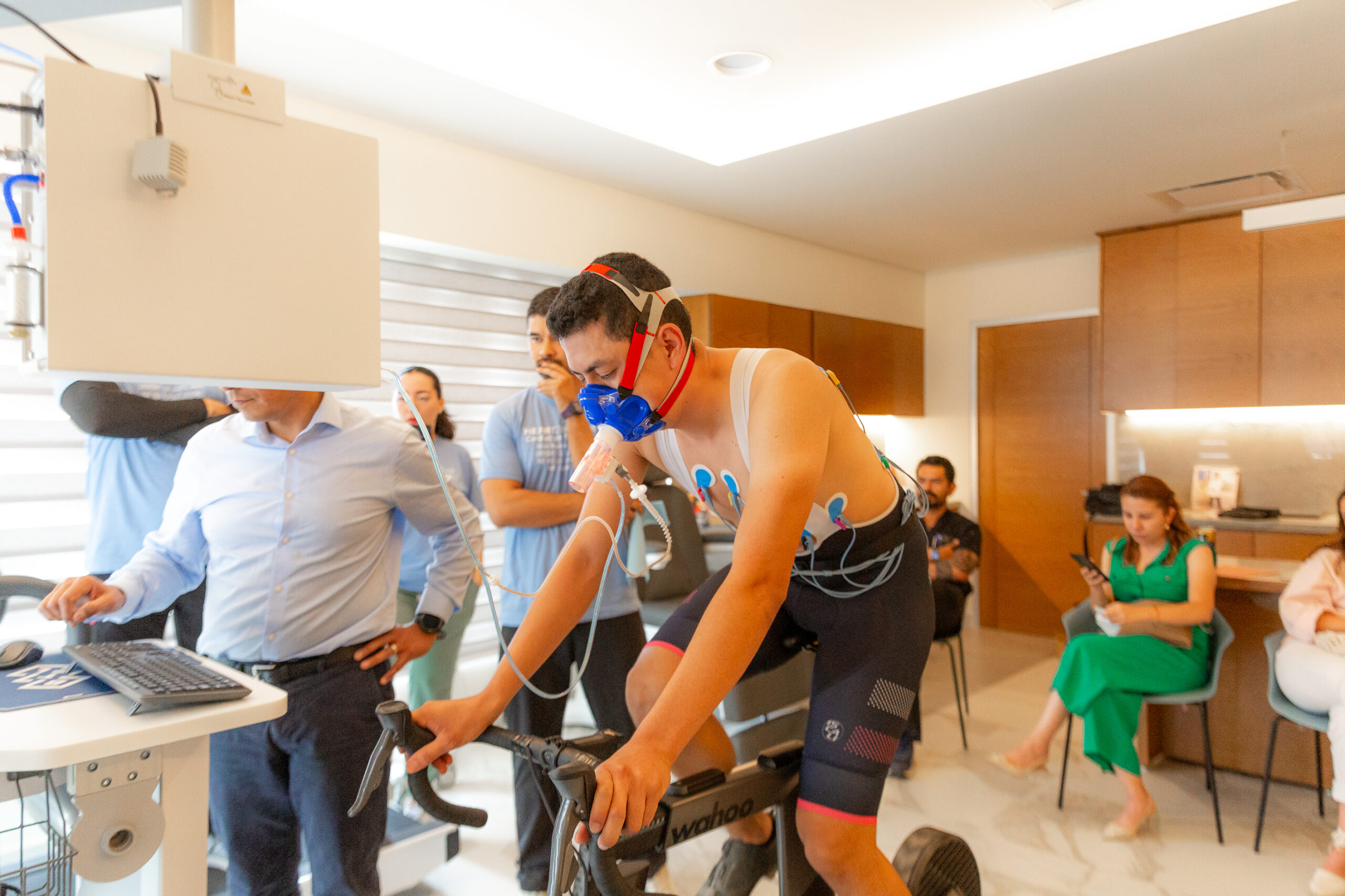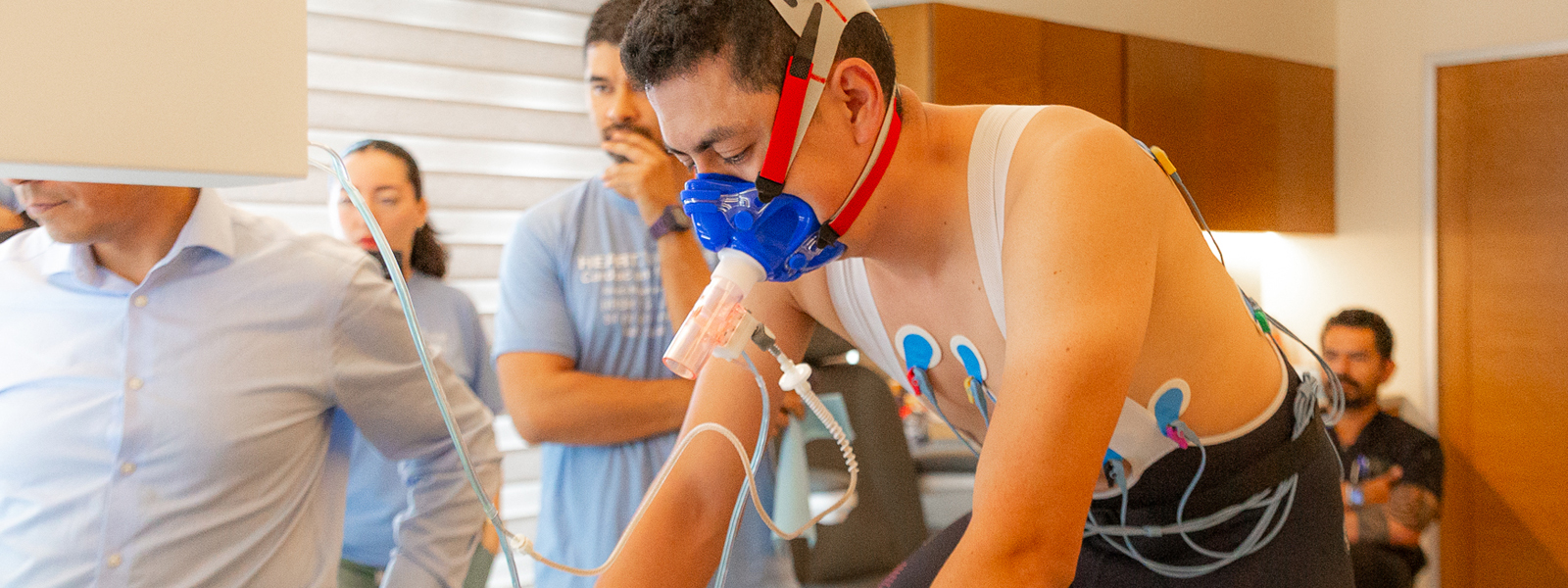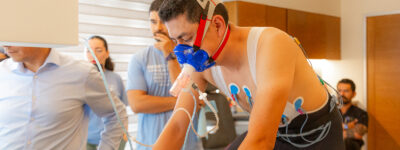Cardiopulmonary Exercise Test: A Comprehensive Assessment of Your Heart and Lung Health
The Cardiopulmonary Exercise Test, commonly referred to as CPET, is a non-invasive medical evaluation that provides a complete picture of how your heart, lungs, and muscles function during physical activity. It is especially useful for identifying the root causes of symptoms like fatigue, shortness of breath, or decreased exercise performance, and for monitoring chronic cardiovascular and pulmonary conditions.
At Hospital CMQ in Puerto Vallarta, we perform CPET tests using advanced technology and expert supervision from our Cardiology Department. This allows us to deliver accurate diagnoses and personalized treatment plans aimed at improving your quality of life. Read on to learn how the CPET test works and what results it provides.
Overview: What is the Cardiopulmonary Exercise Test at Hospital CMQ in Puerto Vallarta?
The Cardiopulmonary Exercise Test (CPET) is a diagnostic tool used to evaluate how well your heart, lungs, and muscles perform under physical stress. It is commonly recommended to uncover the causes of fatigue, shortness of breath, or poor physical performance. At Hospital CMQ in Puerto Vallarta, this test is conducted using state-of-the-art equipment and is supervised by board-certified cardiologists. CPET helps detect medical conditions such as heart failure or chronic respiratory disorders, and it plays a vital role in sports medicine.
What Is the Cardiopulmonary Exercise Test (CPET) and What Is It Used For?
According to the American Heart Association (AHA), the Cardiopulmonary Exercise Test (CPET) is a key tool for measuring how your heart, lungs, and muscles respond to physical activity. It is especially useful for identifying the causes of fatigue, shortness of breath, and reduced exercise capacity. Additionally, it plays a critical role in monitoring chronic heart or lung conditions and evaluating the body’s overall functional capacity.
CPET is considered the gold standard for assessing VO₂ max, or maximal oxygen consumption, one of the most important indicators of cardiorespiratory fitness and endurance. This makes it an essential tool for both clinical diagnosis and performance assessment in athletes.
The Cardiopulmonary Exercise Test (CPET) is the gold standard for evaluating your cardiovascular and pulmonary function. To schedule your test or get more information, call 322 226-6500 or email us at info@hospitalcmq.com
Cabe destacar que esta prueba se utiliza tanto en el ámbito clínico como en el deportivo, ya que, como hemos mencionado es útil para identificar causas de fatiga, disnea y dolor torácico. Pero, también se utiliza para monitorear enfermedades como la insuficiencia cardíaca, EPOC, hipertensión pulmonar y otras condiciones crónicas. Si te encuentras en Puerto Vallarta y te interesa conocer tu salud cardiovascular y pulmonar, agenda tu prueba de esfuerzo en Hospital CMQ. Nuestro equipo de cardiólogos, está listo para ayudarte con una evaluación precisa, segura y personalizada.
Our Specialists Performing and Interpreting the Cardiopulmonary Exercise Test (CPET)
At Hospital CMQ, your cardiovascular health is in the hands of a team of highly qualified specialists with extensive experience in clinical cardiology and diagnostic testing. All of our cardiologists have specialized medical training, years of clinical practice, and active participation in national and international congresses. The CPET test at Hospital CMQ is performed and interpreted by the following experts:
Dr. Leslie Swindle, Specialist in Nuclear Cardiology with training at Harvard General Hospital. Expert in stress testing, Holter monitoring, and Doppler echocardiograms.
Dr. Leonel Molina, Cardiology specialist with subspecialty in cardiac imaging, including CT and MRI. Highly experienced in stress testing, clinical follow-up, and managing complex cardiovascular diseases.
Dra. Nadia Fierro, Cardiologist focused on non-invasive diagnostics such as echocardiography and functional testing, including Holter monitoring, EKG, and CPET.
Advanced CPET Technology at Hospital CMQ
At Hospital CMQ, the Cardiopulmonary Exercise Test is performed using state-of-the-art equipment, including stationary bikes and treadmills with adjustable speed and incline, specifically designed for clinical exercise testing. These are integrated with ECG monitoring systems, allowing for highly accurate real-time clinical data collection.
We also use specialized software to calculate VO₂ max and other key functional indicators. This software complies with guidelines from the American Heart Association (AHA) and the European Society of Cardiology (ESC). Thanks to this advanced technology and the close supervision of our cardiology specialists, we offer a safe, comprehensive, and reliable evaluation for every patient.

How Is the CPET Test Performed?
The CPET test begins with the placement of electrodes on your chest. These electrodes record your heart’s electrical activity through an electrocardiogram (ECG). You’ll also wear a special mask that measures your breathing throughout the test. Once the electrodes and mask are in place, your specialist will ask you to step onto a stationary bike or treadmill, where you’ll begin exercising gradually with progressive increases in intensity.
The Cardiopulmonary Exercise Test is endorsed by the American Heart Association (AHA) and the European Society of Cardiology (ESC). Ready to understand your heart and lung performance? Schedule your CPET today at Hospital CMQ.
Throughout the test, several key parameters are monitored, including:
- Heart rate
- Oxygen consumption (VO₂)
- Blood pressure
- Respiratory response
The exercise continues until you reach your safe exertion limit or if any relevant symptoms appear. In general, the test lasts between 30 and 45 minutes. The results help determine whether symptoms are rooted in the heart, lungs, or muscles, offering a complete picture of your physical condition. “In my clinical experience, the cardiopulmonary exercise test has been essential in diagnosing hidden causes of fatigue in patients who otherwise seemed healthy. It allows us to precisely determine if the origin is cardiac, pulmonary, or muscular, and to develop a more effective treatment plan.”— Dr. Leonel Molina, Cardiologist
How to Prepare for a CPET Test
To ensure accurate and safe results from your Cardiopulmonary Exercise Test (CPET), please follow these recommendations:
- Avoid eating heavy meals for at least 2 to 3 hours before your test.
- Do not consume caffeine, alcohol, or tobacco on the day of your appointment.
- If you take medications for blood pressure or heart conditions, please inform your doctor in advance.
- Wear comfortable clothing and athletic shoes suitable for exercise.
- Make sure to stay well hydrated.
- Arrive early to your appointment to allow time for preparation and evaluation.
How Are CPET Results Interpreted?
According to the American College of Sports Medicine (ACSM), the CPET records multiple key parameters that provide a comprehensive assessment of your cardiovascular and respiratory fitness levels. One of the most important measurements is VO₂ max, which reflects the maximum amount of oxygen your body can utilize during intense physical activity.
Other critical data include:
- Maximum heart rate reached
- Ventilatory efficiency (VE/VCO₂ ratio)
- Oxygen saturation levels
- Exercise tolerance and recovery time
At Hospital CMQ, your results are carefully analyzed by our cardiologists, who consider your age, sex, weight, fitness level, and medical history to deliver a precise and personalized diagnosis. This allows us to identify underlying conditions, monitor chronic illnesses, and guide tailored treatment or training plans.
| Parameter | Normal Value in a Healthy Adult | Meaning |
| VO₂ max. | Men: >35 ml/kg/min Women: >30 ml/kg/min | Aerobic capacity and general physical condition |
| Maximum heart rate | 220 - age | The frequency limit that the heart can reach |
| VE/VCO₂ (ventilatory efficiency) | <30-34 at rest | How efficient is your breathing during exercise |
| Respiratory Index (RER) | 0.7 (rest) - 1.1 (maximum effort) | Level of effort achieved |
Source: American College of Sports Medicine (ACSM)
Note: Values may vary according to age, sex, physical condition, and specific medical conditions. The results must be interpreted by a specialist.
CPET Benefits for Athletes
Looking to take your fitness to the next level? The Cardiopulmonary Exercise Test (CPET) is the tool you need. This advanced evaluation is recommended for athletes of all levels, from beginners to triathletes, runners, cyclists, swimmers, football players, and tennis players. By analyzing your heart, lungs, and muscles under physical stress, CPET allows you to:
- Customize your training plans based on real physiological data
- Prevent injuries through early detection of functional limitations
- Enhance your athletic performance
- Identify cardiovascular anomalies before symptoms appear
“Athletes should consider undergoing a CPET before starting a high-intensity training program or as part of their annual health screening,” explains Dr. Leonel Molina, an expert in Cardiopulmonary Exercise Testing.
Are you an athlete looking to boost your performance?
Book your CPET at Hospital CMQ and train based on real data.
Frequently asked questions about cardiopulmonary stress test in Puerto Vallarta
The complete study lasts between 30 and 45 minutes, including preparation, evaluation, and recovery.
No. It may generate mild physical fatigue, similar to a controlled exercise routine, but it is a safe and tolerable test.
Helps detect heart disease, arrhythmias, heart failure, pulmonary problems, and low functional capacity.
VO₂ max indicates how much oxygen your body can use when exercising. It is key to measuring your endurance and cardiovascular health.
Yes, it is a non-invasive study, performed under medical supervision and with constant monitoring at all times.
At Hospital CMQ, we have specialist cardiologists and advanced technology. Schedule your appointment by email at info@hospitalcmq.com
It is recommended for people with shortness of breath, fatigue, heart or lung disease, and for athletes who wish to optimize their performance.
Risks are minimal, but may include dizziness or fatigue. At Hospital CMQ, this test is performed with continuous monitoring and trained personnel.
The cost varies according to the clinic and the city. You can request a personalized quote when scheduling your appointment at Hospital CMQ.
About the author: This article was written in collaboration with Dr. Leonel Molina, a board-certified cardiologist with more than 15 years of experience in clinical cardiology and cardiovascular imaging, and cardiopulmonary functional assessment.







